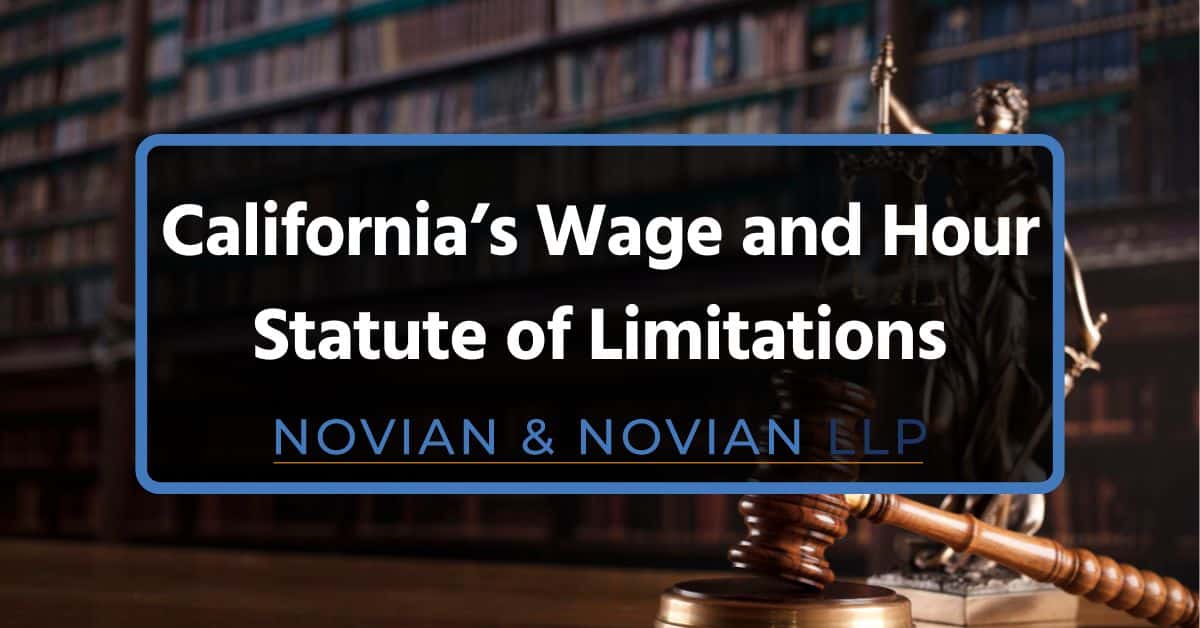California has some of the most employee-friendly wage and hour regulations in the country. California employees can sue employers for unfair business practices, an unpaid wage claim, and unpaid final wages, according to California employment law. While the statute of limitations for wage and hour claims in California varies depending on the nature of the claim, the timeline to file a claim ranges from one to four years.
For more than 35 years, Novian & Novian has been assisting employers and employees with employment claims and wage and hour issues. We are the go-to employer defense attorneys you need to guide you through complex legal solutions that protect your business interests and help you through the process of wage and hour claims. Book a free consultation with us now to learn how we can help you stay compliant as a business owner or assist you with a wage and hour claim.
This blog breaks down how long you have to file wage and hour claims in California, how different labor code violations affect the statute of limitations, and what to do if your employer violated state wage laws. You’ll also learn how related employment claims, unfair business practices, and written or oral contract issues can impact your time limit to take legal action.
Table Of Contents
- Wage and Hour Laws in California
- Wage and Hour Statute of Limitations in California
- What Are The Exceptions and Extensions for California Wage and Hour Statute of Limitations?
- How Do I File Statute of Limitations Claims?
- What Are The Consequences of Non-Compliance and Missing Deadlines?
- How Can You Benefit From Consulting With An Employment Lawyer?
- FAQs
Wage and Hour Laws in California
California wage and hour laws provide some of the strongest protections for employees in the country, ensuring workers are paid fairly and on time. These laws cover every part of the employer-employee relationship, including minimum wage requirements, overtime pay rules, meal and rest break rights, timely payment of final wages, and reimbursement for necessary business expenses. When an employer’s failure to follow these rules results in unpaid wages, rest break violations, minimum wage violations, or other labor code violations, employees have the right to file a wage and hour claim to recover what they are owed.
California law requires employers to maintain accurate employment records, pay overtime for all qualifying hours, provide required meal and rest breaks, and pay departing employees all earned wages without delay. Wage and hour disputes often arise when employers misclassify workers, deny overtime pay, force off-the-clock work, fail to provide breaks, or engage in unfair business practices that violate state labor protections. California employees may bring an unpaid wages claim through the Labor Commissioner’s Office or by filing a civil lawsuit in state or federal district court, depending on the nature of the hour claim and related employment claims involved.
Since wage and hour issues can overlap with written contract claims, oral promise disputes, or claims under California’s Unfair Competition Law, determining the proper legal process can be complex. An experienced employment attorney can help you identify every violation, calculate all the wages owed, seek waiting time penalties, and hold your employer accountable for hour violations under California law. If you believe your employer violated wage laws or you need help understanding your rights, seeking legal advice promptly is essential to protect your claim and maximize your recovery.
Wage and Hour Statute of Limitations in California
The statute of limitations is a legal principle that sets the maximum time after an event within which legal proceedings may be initiated. It is through this principle that we have deadlines for filing claims related to unpaid wages, wrongful termination statute of limitations, overtime, rest breaks, and other labor code violations.
It ensures legal disputes are resolved within a reasonable timeframe. This promotes fairness by preventing the indefinite hanging of potential legal action over the parties involved. In addition, this legal principle maintains the integrity of evidence and the reliability of witness testimonies. It is important for all employers to understand these deadlines so that they manage legal risks properly.
In California, the statute of limitations for wage and hour claims varies depending on the type of claim. For example, most wage and hour violations, like unpaid wages, overtime, minimum wage, and rest break violations, carry a three-year statute of limitations. However, certain claims, like an oral promise, may have a different statute of limitations. An oral contract usually has a two-year limit, while a written contract allows up to four years for claims. Furthermore, other unpaid wage claims, like unpaid overtime, minimum wage violations, and missed rest breaks, have a three-year statute of limitations.
| Claim Type | Statute of Limitations | Notes |
|---|---|---|
| Written Contracts | 4 years | Or extension under unfair business practices |
| Oral Contracts | 2 years | Need witnesses for oral agreements |
| Paycheck Violations | 1 year | Missing itemized wage statement |
| Overtime / Minimum Wage | 3 years | Includes missed meal/rest breaks |
| Waiting Time Penalties | 3 years | Starts last day of employment |
One-Year Statute of Limitations
Certain wage and hour violations must be filed within one year. This includes claims involving wage statements or paycheck violations, such as an employer’s failure to provide accurate and itemized wage statements. If your employer violated Labor Code section 226 by withholding information or issuing incorrect pay stubs, you must file your wage and hour claim within one year of the violation.
Two-Year Statute of Limitations
Employees generally have two years to file claims based on an oral contract. This applies when an employer made verbal promises about wages, raises, bonuses, promotions, or other compensation terms. Because these agreements are not written, you may need witnesses, texts, or other evidence to support your unpaid wages claim based on an oral promise.
Three-Year Statute of Limitations
Many of the most common California wage and hour disputes fall under a three-year statute of limitations. This includes unpaid overtime claims when employees were denied time-and-a-half or double time for qualifying hours. Minimum wage violations also fall under this period, including an employer’s failure to pay the state minimum wage or higher city-specific minimum wage rates.
Employees also have three years to file claims involving missed meal or rest breaks, which require employers to pay one additional hour of wages for each missed break. Misclassification claims, where an employer treated you as an independent contractor instead of an employee, also fall within this three-year period.
Additionally, claims for unpaid final wages, including a missing final paycheck or unpaid unused vacation, must be brought within three years. Employees seeking waiting time penalties for an employer’s failure to pay all the wages at the time of separation also have up to three years from their last day of employment to pursue legal action.
Four-Year Statute of Limitations
Certain wage and hour issues involving written agreements fall under a four-year statute of limitations. This includes claims based on breach of a written contract between the employee and employer regarding wages or other compensation. A four-year statute also applies when employees pursue wage recovery through California’s Unfair Competition Law, which allows workers to extend certain wage and hour claims beyond the standard three-year limit.
What Are The Exceptions and Extensions for California Wage and Hour Statute of Limitations?
California wage and hour laws include several exceptions and extensions that can lengthen the time limit to file a claim. One major exception applies when an employee brings a claim for unfair business practices, which can extend wage and hour disputes from three years to four years under the Unfair Competition Law. Another exception occurs when multiple violations overlap, such as unpaid wages combined with waiting time penalties or reimbursement claims, which may allow employees to pursue related employment claims under different statutes of limitations. In some cases, the statute may be tolled, or paused, if the employer concealed records, failed to provide access to employment records, or engaged in conduct that prevented an employee from discovering the labor code violations earlier.
Employees may also receive an extension if the California Labor Commissioner’s Office is handling the claim, as some deadlines pause while the agency investigates. Additionally, federal wage claims filed in federal district court under the FLSA have their own timelines, which may provide alternative pathways for recovery when California deadlines have expired. Because these exceptions are complex and fact-specific, it is important to seek legal advice promptly to avoid losing your right to file a wage and hour claim.
How Do I File Statute of Limitations Claims?
Filing wage and hour claims within the statute of limitations is essential for protecting your rights under California law. The process differs slightly for employees and employers, but both sides must follow specific steps to preserve evidence, comply with labor code requirements, and navigate the legal process properly.
Steps for Employees
1. Gather Employment Records: Collect pay stubs, timecards, schedules, emails, contracts, and any documentation showing unpaid wages, rest break violations, minimum wage violations, or overtime pay owed. Accurate documentation is crucial for proving your hour claim.
2. Review the Applicable Statute of Limitations: Determine whether your wage and hour dispute falls under the 1-year, 2-year, 3-year, or 4-year deadline. This includes identifying whether the claim involves labor code violations, oral contracts, written contracts, or unfair business practices.
3. Calculate All the Wages and Penalties Owed: Employees can often recover unpaid wages, meal and rest break premiums, interest, business expenses, waiting time penalties, and attorneys’ fees depending on the violation.
4. File a Claim With the Labor Commissioner or Through a Civil Lawsuit: You may file a wage claim with the Labor Commissioner’s Office or pursue a civil lawsuit in state or federal district court, depending on the type of wage and hour claim and your legal strategy.
5. Get Legal Advice Before Filing: Since statute of limitations issues can be complex, especially when multiple claims overlap, it’s best to consult an employment lawyer to ensure you don’t miss important deadlines or leave compensation on the table.
Steps for Employers
1. Conduct an Internal Audit: Employers should review payroll records, timekeeping systems, wage statements, and policies for compliance with California wage and hour laws.
2. Preserve Employment Records: Once a dispute arises, employers must retain all relevant records, including pay stubs, timesheets, and communications with the employee.
3. Assess Potential Labor Code Violations: Employers must determine whether any unpaid wages, missed rest breaks, or incorrect pay statements occurred and whether the statute of limitations is still open.
4. Respond Promptly to Claims: Employers must respond to Labor Commissioner notices or civil lawsuits in a timely manner to avoid default judgments, penalties, and increased liability.
5 Seek Legal Counsel: Wage and hour disputes can escalate quickly. Employers should work with employment attorneys to navigate claims, negotiate settlements, and prevent further violations.
What Are The Consequences of Non-Compliance and Missing Deadlines?
Legal remedies might include negotiation, arbitration, or, if timely, litigation. It’s crucial to seek legal advice to explore alternatives such as tolling or exceptions that might extend deadlines. This step ensures rights and obligations are adequately addressed.
Missing the statute of limitations for wage and hour claims can severely impact both employees and employers. For employees, failing to file before the deadline usually means permanently losing the right to recover unpaid wages, overtime pay, rest break premiums, business expense reimbursements, waiting time penalties, and other compensation allowed under California wage and hour laws. Even when an employer clearly violated labor code requirements, courts will dismiss untimely claims because the statute of limitations is considered a strict legal cutoff.
For employers, non-compliance can lead to significant financial and legal consequences. If an employer violated wage and hour laws and the claim is filed on time, they may be required to pay all the wages owed, interest, statutory penalties, attorneys’ fees, and additional damages for unfair business practices. Failure to respond to claims promptly can result in judgments for large amounts, especially in cases involving multiple employees or class actions. Employers may also face reputational harm, government investigations, or further penalties for failing to maintain proper employment records.
How Can You Benefit From Consulting With An Employment Lawyer?
We’ve covered the key California wage and hour statute of limitations, including the 1-year, 2-year, 3-year, and 4-year deadlines; exceptions and extensions; the legal process for filing claims; and the serious consequences of missing filing timelines. Understanding these rules is essential, but navigating them alone can be overwhelming, especially when employers dispute your claim or fail to provide accurate employment records. Therefore, consulting an employment attorney ensures you have someone protecting your rights, gathering evidence, and holding your current or former employer accountable under California law.
If you believe your employer violated wage and hour laws or failed to pay you all the wages you earned, or if you need help understanding your legal options, contact Novian & Novian today. Our experienced employment attorneys are ready to evaluate your case and guide you through every step of the process.
FAQs
The California wage and hour statute of limitations can be confusing, but knowing your rights is essential to recover unpaid wages, overtime pay, or other wage and hour violations. These frequently asked questions provide clear guidance on timing and deadlines for filing claims and taking legal action.
How Long After Not Getting Paid Can You Sue?
In California, employees generally have up to three years to file a wage and hour claim for unpaid wages, including minimum wage, overtime, or missed rest breaks. Certain claims, such as wage statement violations, may have a shorter one-year statute of limitations.
How Long Does A Company Have To Correct A Payroll Error in California?
Employers are required to correct payroll errors and pay any owed wages promptly under California law. While there is no specific number of days mandated for correction, employees can file a wage claim with the Labor Commissioner if the error is not resolved quickly.
How Long Do I Have To File A Wage Claim in California?
The timeframe depends on the type of wage and hour violation: one year for wage statement violations, two years for oral contract claims, and three years for unpaid wages, overtime, or rest break violations. Some claims under written contracts or unfair business practices may extend to four years.
What is the Statute of Limitations on Wage Claims in California?
California wage and hour claims have varying statutes of limitations depending on the violation, ranging from one to four years. Filing within these deadlines is essential to recover unpaid wages, penalties, or other compensation under California law.




